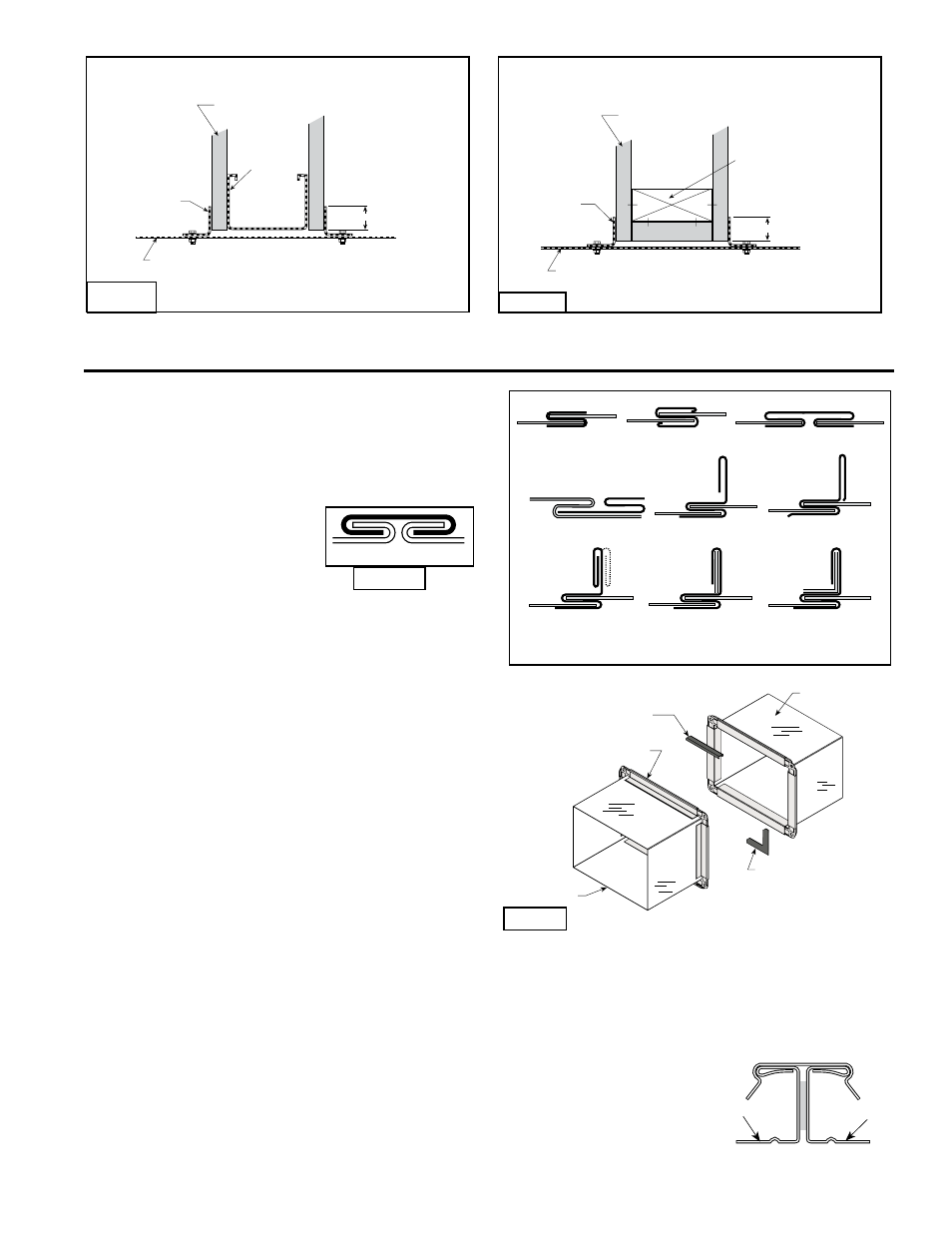Breakaway connections, Figure 7, Figure 8 – Greenheck Multi-blade Fire & Combination Fire Smoke Dampers Installation Booklet (826249) User Manual
Page 26: Figure 6, Drive slip joint

Breakaway Connections
Traditional Breakaway Style Transverse Joints
Transverse joints illustrated at right have always been
approved as breakaway connections. SMACNA testing
has also approved the following variations as breakaway
connections.
• The breakaway connections shown (Figure 8) can
be applied with maximum of
two #10 (19mm) sheet metal
screws on each side and on
the bottom located in the
center of the slip pocket and
penetrating both sides of the
slip pocket.
• Transverse joints illustrated can be applied as top
and bottom joints with Drive Slip - side joints in duct
heights up to 20 inches (508mm)
See Figure 7.
Round and Oval Duct Breakaway Connections
Round or flat oval ducts connected to Type R or O damper
collars shall be attached with #10 (19mm) sheet metal
screws as follows:
• Ducts to 22 in. (558mm) wide (or dia.) and smaller
shall have three screws.
• Ducts larger than 22 in. (558mm) wide (or dia.) up to
and including 36 in. (914mm) wide (or dia.) shall have
five screws.
NOTE: All breakaway connections described may have
duct sealant applied, PA2084T duct sealant
adhesive manufactured by Precision, DP1010
water base duct sealant manufactured by Design
Polymetrics, Grey Pookie, Ductmate PROseal
®
,
or CL Ward S Seal in accordance with SMACNA
recommendations.
Manufactured Flanged System Breakaway
Connections
Flanged connection systems manufactured by Ductmate,
DuroDyne, Ward, and Nexus are approved as breakaway
connections when installed as illustrated (Figure 9).
Drive Slip Joint
Figure 7
Plain “S” Slip Hemmed “S” Slip
Double “S” Slip
Inside Slip Joint
Standing “S”
Standing “S” (Alt.)
Standing “S” (Alt.)
Standing “S”
Standing “S”
(Bar Reinforced)
(Angle Reinforced)
Figure 8
Fire Damper Sleeve
Neoprene or Butyl gasket
between all angles
Flanged system angles
(Attach per
manufacturer's
instructions)
Duct
3/8 in. bolts in
corners are optional
6 in. long 1/16 in. max.
thickness plastic cleats;
12 in. c-c (min. 1 per side)
Figure 9
Proprietary Flange System Breakaway Connections
(TDC by Lockformer, TDF by Engle)
TDC and TDF systems are approved as breakaway
connections when installed as described in the TDC
or TDF addendum to the SMACNA Duct Construction
Standards. Standard 6 in. (152mm) metal clip may be used
with spacing as shown in Figure
10. 3/8 in. (9.5mm) metal bolts
and nuts may be used to fasten
together corner pieces (see
Figure 11).
Duct
Sleeve
6 in.
Std. Clip
Length
CL
Duct
60 in. Duct
4 Req’d.
48 in. Duct
3 Req’d.
36 in. Duct
3 Req’d.
24 in. Duct
2 Req’d.
18 in. Duct &
Smaller
1 Req’d.
Clip Spacing
Typical TDC/TDF joint
6 in.
6 in.
9 in.
7 in.
7 in.
5 in.
5 in.
5 in.
5 in.
Metal Stud Construction
Wooden Stud Construction
In wood stud construction,
gypsum wallboard must cover
all wood stud surfaces.
Gypsum Wallboard
Stud or Runner
Retaining
Angle
1 in. Min.
Damper
Sleeve
In metal stud construction,
exposed steel surfaces need
not be covered with gypsum
wallboard.
Gypsum Wallboard
Stud or Runner
Retaining
Angle
1 in. Min.
Damper
Sleeve
Figure 7
Metal Stud Construction
Wooden Stud Construction
In wood stud construction,
gypsum wallboard must cover
all wood stud surfaces.
Gypsum Wallboard
Stud or Runner
Retaining
Angle
1 in. Min.
Damper
Sleeve
In metal stud construction,
exposed steel surfaces need
not be covered with gypsum
wallboard.
Gypsum Wallboard
Stud or Runner
Retaining
Angle
1 in. Min.
Damper
Sleeve
Figure 6
26